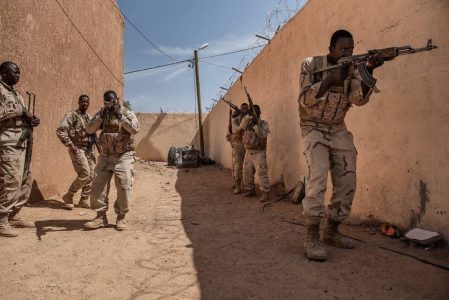
The terrorism threat in West Africa soars as the U.S. weighs troop cuts
The Pentagon and the State Department are sending mixed messages about reducing America’s presence in a region bloodied by terrorist violence.
The Trump administration is split over how to combat terrorists, support allies and thwart global competitors in West Africa. And the mixed messages out of Washington are confusing allies in Europe, who are deeply committed to security in Africa, as well as to military partners on the continent.
Secretary of State Mike Pompeo just wrapped up a major trip to Africa, including a stop in Senegal, pledging more security support and warning against growing Chinese influence. But back in Washington, Defense Secretary Mark T. Esper is weighing deep U.S. troop cuts on the continent, closing a new $110 million drone base and ending aid to French forces battling militants who are surging in Mali, Niger and Burkina Faso.
The muddled administration policy comes at a time when skyrocketing waves of terrorism and violence have seized Africa’s Sahel region, a vast sub-Saharan scrubland that stretches from Senegal to Sudan, and is threatening to spread.
Cutting American aid could not only weaken French-led counterterrorism efforts, analysts say. It could also open the door to China and Russia, which are ready to seize any foothold the United States cedes on the continent, dangling deals for new ports and railroads as well as arms and mercenaries, and overall influence. China now has more embassies in Africa than the United States, 52 to 49.
“The U.S. is losing the competition in Africa against China, Russia, Al Qaeda and the Islamic State,” said Katherine Zimmerman, an analyst with the American Enterprise Institute in Washington. “It’s not losing militarily, but in the soft-power space.”
African troops are voicing concern about a reduced American commitment to fighting violent extremism, expressions heard during a two-week, Pentagon-sponsored counterterrorism exercise in Mauritania and Senegal this month that drew 1,500 military personnel from 30 African and Western countries.
“It would degrade the standard of training if the U.S. left,” said a 30-year-old Nigerian Special Forces officer, who under the exercise’s ground rules could be identified only as Captain Samuel.
The proposed U.S. troop cuts in West Africa come amid a growing torrent of attacks by Islamic State and Qaeda affiliates — often working together in a rare reversal of their bitter rivalry in the Middle East and elsewhere in the world — especially in Burkina Faso, Mali and Niger.
Armed groups have attacked bridges, military convoys and government buildings. Three thousand schools have closed because of terrorist threats, and militants have assassinated mayors and other local leaders suspected of collaborating with the authorities.
The United Nations envoy for West Africa and the Sahel, Mohamed Ibn Chambas, said last month that attacks in the three countries had increased fivefold since 2016, with more than 4,000 deaths reported in 2019 compared with an estimated 770 deaths three years before.
The threat is pushing south from the Sahel into areas previously untouched by extremist violence, including the Ivory Coast, Benin, Togo and Ghana, where the Pentagon has a logistics hub.
Security has deteriorated so badly that the Pentagon’s Africa Command told the Defense Department’s inspector general this month that it had abandoned for the moment a strategy of weakening the Islamist militants, and instead was mainly trying to contain the threat.
Military officials and independent analysts stressed that American and other Western military aid may at best buy time for African allies to address poverty, lack of education, government corruption and other grievances that extremist groups seek to exploit. But there is little confidence that these daunting, endemic problems will be resolved soon. That leaves the United States and its European allies to keep the threat from spreading.
The State Department has in the past two years provided $323 million in training and other security assistance to the so-called G5 Sahel countries — Burkina Faso, Mali, Niger, Chad and Mauritania. But the G5 force, ultimately set to grow to 5,000 troops, has been slow to halt the militants’ advance.
Source: TW News





